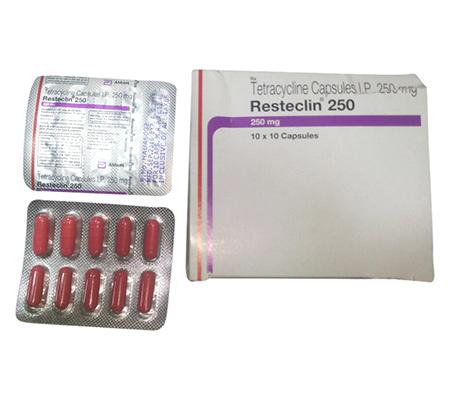Resteclin works by preventing the growth and spread of bacteria in the body to allow the immune system to kill off the bacteria. Resteclin is a polyketide antibiotic which is effective for use against a variety of infections caused by bacteria. This medicine is commonly used as a treatment for acne, and has even been used by some people to treat rosacea. Other conditions treated include chlamydia, urethritis, syphilis, chlamydia, gonorrhoea, trachoma, brucellosis, leptospirosis, tetanus, cholera, infections occurring as a result of mycoplasma organisms, and many other types of infection.
This medicine interrupts the bacteria's production of vital proteins, and without these proteins, the growth and multiplication of the bacteria is seriously inhibited, thereby stopping the spread of the infection and allowing the immune system to destroy the remainder of the bacteria.
Resteclin should be taken as directed by a doctor, usually 2 to 4 times per day. The capsules should be taken on an empty stomach, at least 2 hours following or 1 hour prior to a meal along with a full glass of water. Contact a doctor for the correct length of treatment and dosage as it will depend on the condition being treated and the patients response to the treatment. Resteclin is not recommended to consume dairy products while using the medication as they may alter the bodys ability to absorb the drug.
The dosage for acne is sometimes 500 mg, taken twice per day. Treatment may last for 2 weeks (or in some cases, more), depending on how severe the infection is. Patients undergoing treatment for rectal, urethral or endocervical chlamydia may be prescribed a dosage of 500 mg, taken 4 times per day, with treatment lasting for a period of at least 7 days. The dosage required for pneumonia, Lyme disease, psittacosis, ornithosis, syphilis, bronchitis and any other condition will vary, and the dosage regimen will be determined by the prescribing doctor.
Patients who are undergoing treatment with Resteclin may sometimes experience side effects, such as: diarrhoea, vaginal symptoms, skin discolouration, sores inside or around the mouth, inflammation or sores visible on the genitals or rectum.
During the course of treatment, patients are advised to notify their doctor of any side effects which occur. Severe reactions may occur in a rare number of cases. Seek medical attention immediately if you notice fever, changes in urination habits, bruising, bleeding, stiff joints or any other symptoms of a serious reaction.






